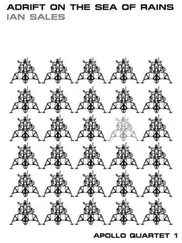So she approaches Walden one evening:
We have the house how we want it now, Ginny says, do you think I’d be allowed to see inside the Manned Spacecraft Center?
Allowed? replies Walden. Sure, you want me to take you round?
You can do that?
Sure, Walden assures her offhandedly.
And the Cape, I’d like to see that too, the launch pad and everything.
Hey, small steps, hon, Walden says. I’ll take you in one day next week for a tour of the MSC, how about it?
It takes him several reminders before he eventually arranges something. On the day, Ginny drives to the MSC around mid-morning. The guard on the gate has obviously been informed and waves her straight through. She directs the Impala to where she’s been told to park, and soon spots a figure in a pale blue flight jacket striding across the lot toward her. Even from this distance, even in clothing much like that worn by all the astronauts, she can tell from the way he moves it’s her husband. Once Walden reaches her, he looks her up and down, vetting her appearance, although he has made no mention of a dress code. But what she has chosen she thinks he won’t criticise, a double-breasted dress, belted, with pleated skirt, in a nice sober blue, and matching heels. She’s even wearing gloves, white cotton ones, she hasn’t worn a pair since she was a teenager, though she has seen other wives in gloves on their way to church on a Sunday.
You look nice, says Walden—but it’s perfunctory.
He doesn’t even peck her on the cheek, just turns about and heads back toward the nine-storey building from which he came. She trots after him, walking faster than normal to keep up. She wonders what’s wrong, why this treatment, but as they step inside the building she sees Walden appears neither vexed nor impatient nor annoyed. He is smiling, he looks confident, he looks at ease.
This way, hon, he says.
He walks beside her, perhaps a pace or two in front, he doesn’t hold her, he doesn’t touch her, but he still seems to possess her. She can feel it like a forcefield extending about her, warding off all curiosity—because she is Mrs Walden J Eckhardt. At times like this she wishes Virginia G Parker were not a secret, she’s sure a male science fiction writer, though there are only a handful of them, would have been given VIP treatment.
#
What building is this? Ginny asks. Engaging her husband in conversation, she hopes, might slow his pace.
Administration, he replies.
How many buildings are there?
Hell if I know. Twenty, twenty-five, I guess.
Where are we going?
They exit the rear of the Administration Building, back out into the sunlight. Ginny stumbles, taken by surprise—she’s heard the MSC described as a campus, and she’s imagined something like her alma mater, SDSU, a tightly-packed complex of inter-connected buildings and small dark courtyards. Not this great park like a golf course, with three irregular lakes, scattered trees and low rolling hills of grass. Lined about its circumference are white office blocks, most no more than two or three storeys tall, and some buildings which resemble hangars or large storage sheds with blank aluminum sides and flat roofs.
Walden has halted at the abrupt double-tap of Ginny’s heels on the asphalt path, and looks back at her. She gives him a wan smile and says, It’s very pleasant.
Walden shrugs. Mission Control Center first, he tells her.
She can see his heart is not in this tour, perhaps he hoped she’d forget her request. But she knows some of the other wives have been to the MSC, have seen what it takes to put their husbands into space, keep them alive up there, and then bring them back safely to Earth. She thinks she knows what to expect, she’s seen photographs of the MCC, although she can’t remember where. Not in any of her science fiction magazines—though they may support the space program, the fact it’s a wholly male undertaking rankles with the magazines’ chiefly female readerships. Ginny has seen as much in letter columns, a kind of reverse snobbery which suggests the imaginary space missions of science fiction fans are somehow a greater achievement than actually putting a man on the Moon—
And Walden ushers Ginny into a shed-like building, along a corridor and through a door—there was a sign on it, but she didn’t manage to read it—and she finds herself standing in a viewing gallery at the back of a room the size of a high school gym. But it’s not filled with ropes and benches, or young men in vests and shorts running back and forth between a pair of baskets… There are instead eight lines of large consoles, four to either side of a central aisle, and they’re stepped so all have a good view of the five giant screens on the opposite wall. Half a dozen people sit at each of the consoles, and they’re all men, all young, in short-sleeved white shirts and sombre ties and spectacles, and she just knows every one of them is an engineer, they look like engineers. What’s that phrase Walden uses, Ginny thinks; and then as it comes to her she puts a hand to her mouth to hide a snort of laughter: “pencil-necks”. Those guys there, they’re pencil-necks. Walden and the other astronauts seem to hold them in some small contempt—and some not so small respect too, because they know their lives are in their hands.
Wow, says Ginny.
She steps down to the window and peers this way and that, puts a gloved hand up to the glass, and she’s staring at the consoles, trying to make out what the scrolling lines of white-on-black numbers on the monitors might mean, she’s marvelling at the thick manuals splayed open or piled on every surface, she’s impressed by the earnestness and confidence with which these pencil-necks operate their screens and buttons and switches.
Something about the Mission Control Center strikes Ginny as bizarrely familiar, and it’s a moment before she figures out what: one-upmanship. It seems to seep through the glass, a miasma of intellectual Darwinism, it’s there to see in the desperate way the engineers grab manuals and point out something on a page, the urgency with which they scribble notes and calculations, the need for approval evident in every bespectacled gaze in the MCC. It’s nothing like the testosterone which coloured the air at Edwards, or perhaps it’s a less potent version of it, but there is still a sense that not only do these engineers know they’re the best at what they do but they also feel an addict’s compulsion to demonstrate it time and time again.
Walden walks down to join her at the glass, and Ginny abruptly realises most of the men in the MCC have turned about and are now staring at her as if they’ve never seen a woman before. She feels Walden slide an arm around her waist and she gives an abashed smile, looks to her husband, back again into the MCC… and sees the pencil-necks’ gazes have now shifted to Walden—and from their expressions alone Ginny knows that her husband is an astronaut .
Is there anything happening? she asks him.
She’s beginning to feel like an exhibit in a zoo, one of a mating pair of exotic animals when, really, she’s the one on the outside looking in .
Walden makes a face. There’s an unmanned flight of the Apollo stack scheduled for next month, he tells her, so they can man-rate the Saturn V.
That’s the one that’s going to take you to the Moon?
He manhandles her about, none too gently, and with a hand to the small of her back, directs her up the steps to the exit from the gallery. Out in the corridor, she pulls away from him, and she can sense him simmering.
Not me, he snaps. I’m just one of the greenhorns, I’ve not even been asked to support a flight.
I’m sure you’ll get your chance, she assures him. But she knows the words are empty, as does he, her sympathy won’t get him what he desires most. She’s doing her best, she’s been trying so hard, just look at the way she’s dressed, she goes to the beauty parlour regularly, she attends the AWC meetings and stays on good terms with all the other wives.
Читать дальше












